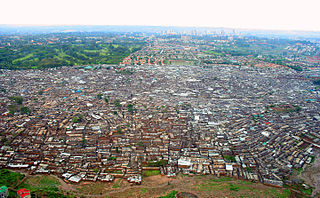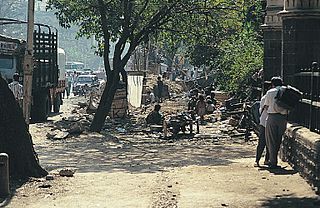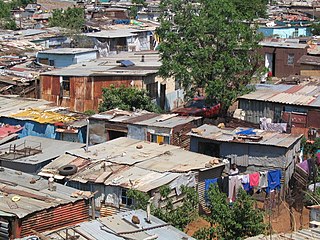Related Research Articles

A slum is a highly populated urban residential area consisting of densely packed housing units of weak build quality and often associated with poverty. The infrastructure in slums is often deteriorated or incomplete, and they are primarily inhabited by impoverished people. Although slums are usually located in urban areas, in some countries they can be located in suburban areas where housing quality is low and living conditions are poor. While slums differ in size and other characteristics, most lack reliable sanitation services, supply of clean water, reliable electricity, law enforcement, and other basic services. Slum residences vary from shanty houses to professionally built dwellings which, because of poor-quality construction or lack of basic maintenance, have deteriorated.

Slum clearance, slum eviction or slum removal is an urban renewal strategy used to transform low income settlements with poor reputation into another type of development or housing. This has long been a strategy for redeveloping urban communities; for example slum clearance plans were required in the United Kingdom in the Housing Act 1930, while the Housing Act of 1937 encouraged similar clearance strategies in the United States. Frequently, but not always, these programs were paired with public housing or other assistance programs for the displaced communities.

Women in Informal Employment: Globalizing and Organizing (WIEGO) is a Manchester-based global research - policy network focused on improving conditions for workers in the informal economy. WIEGO's members include membership-based organizations of workers in the informal economy, researchers and development professionals.

Kibera is a division of Nairobi Area, Kenya, and neighbourhood of the city of Nairobi, 6.6 kilometres (4.1 mi) from the city centre. Kibera is the largest slum in Nairobi, and the largest urban slum in Africa. The 2009 Kenya Population and Housing Census reports Kibera's population as 170,070, contrary to previous estimates of one or two million people. Other sources suggest the total Kibera population may be 500,000 to well over 1,000,000 depending on which slums are included in defining Kibera.

A waste picker is a person who salvages reusable or recyclable materials thrown away by others to sell or for personal consumption. There are millions of waste pickers worldwide, predominantly in developing countries, but increasingly in post-industrial countries as well.
Jockin Arputham was an Indian community leader and activist, known for his campaigning work of more than 40 years on issues related to slums and shanty towns. He was born in Karnataka, India and moved to Mumbai, where he quickly became politicized and established himself as a community leader. In 2014, he was nominated for the Nobel Peace Prize, alongside the organisation he helped to found, Slum Dwellers International.
The National Slum Dwellers Federation (NSDF) in India was established by Jockin Arputham when he fought on behalf of a community of 70,000 to appeal a 1976 eviction order. It is a national organization which brings together multiple communities and their leaders who live in slum settlements around India. NSDF along with Mahila Milan are one of the oldest members of the Urban Poor Fund International Network. Due to the efforts of NSDF, around 90 buildings and 300 toilet blocks have been constructed in Mumbai, providing houses and sanitation to over 35,000 families. Additionally, around 100 toilet blocks have been constructed in Pune.
Mahila Milan is a self-organised, decentralised collective of female pavement dwellers in Bombay. The group works with issues such as housing, sanitation, and grassroots lending schemes. It aims at gaining women equal recognition for improvement of their communities, while indulging in important decision making activities. The loans granted by the group to its members in times of need, are sanctioned in the name of the woman of the house.

Pavement dwellers refers to informal housing built on the footpaths/pavements of city streets. The structures use the walls or fences which separate properties from the pavement and street outside. Materials include cloth, corrugated iron, cardboard, wood, plastic, and sometimes also bricks or cement.

Sheela Patel is an activist and academic involved with people living in slums and shanty towns.
We, the Invisible was a report based on a 1985 census of around 6,000 pavement dweller families, funded and carried out by the Society for the Promotion of Area Resource Centers (SPARC) and the Society for Participatory Research in India (PRIA). It drew attention to this disadvantaged group and helped to reduce the number of violent evictions.

The KwaZulu-Natal Elimination and Prevention of Re-emergence of Slums Act, 2007 was a provincial law dealing with land tenure and evictions in the province of KwaZulu-Natal in South Africa.
Kisumu Ndogo is a name given to "villages" that are part of two informal settlements in Nairobi, Kenya, Kibera and Korogocho. Kisumu Ndogo means little Kisumu. Most dwellers of these villages are believed to be of low income. Nowadays, there are many villages across the country called Kisumu Ndogo. for example, there are in fact two Kisumu Ndogo villages in Kilifi county alone, one in Malindi sub county and one in Kilifi North sub county. There is also one in Mombasa and Nakuru Counties.

Martha Chen is an American academic, scholar and social worker, who is presently a lecturer in public policy at the Harvard Kennedy School and senior advisor of the global research-policy-action network WIEGO and a member of the Advisory Board of the United Nations University World Institute for Development Economics Research (UNU-WIDER). Martha is a development practitioner and scholar who has worked with the working poor in India, South Asia, and around the world. Her areas of specialization are employment, poverty alleviation, informal economy, and gender. She lived in Bangladesh working with BRAC, one of the world's largest non-governmental organizations, and in India, as field representative of Oxfam America for India and Bangladesh for 15 years.
The Asian Coalition for Housing Rights (ACHR) is a network of community organisations in Asia working on issues related to urban poverty, slums and slum upgrading. It champions low-income and other marginalised groups living in cities as experts on urban poverty, and as actors capable of contributing to urban development.

Illegal housing in India consists of huts or shanties built on land not owned by the residents and illegal buildings constructed on land not owned by the builders or developers. Although illegal buildings may afford some basic services, such as electricity, in general, illegal housing does not provide services that afford for healthy, safe environments.
Slums are traditionally described as dense urban settlements, usually displaying characteristics such as crowded and compact housing units, informal delivery of utilities, and unofficial recognition by local government. In the Philippines, residents of slum areas are commonly referred to as "squatters" and have historically been subject to relocation or forced demolition. With a steadily growing metropolitan area, Metro Manila is subject to a densifying population of slum dwellers—a 2014 article states that Manila has an estimated 4 million people living in slums, out of a total population of 21.3 million.

Cities Alliance is a global partnership fighting urban poverty and supporting cities to deliver sustainable development. To manage its activities, the Cities Alliance operates a multi-donor fund with UN Office for Project Services (UNOPS), as host and trustee. Different members provide direction, financing and advocacy. Cities Alliance aims to deliver solutions to urban poverty.

Informal housing or informal settlement can include any form of housing, shelter, or settlement which is illegal, falls outside of government control or regulation, or is not afforded protection by the state. As such, the informal housing industry is part of the informal sector.

Squatting in Ghana is the occupation of unused land or derelict buildings without the permission of the owner. Informal settlements are found in cities such as Kumasi and the capital Accra. Ashaiman, now a town of 100,000 people, was swelled by squatters. In central Accra, next to Agbogbloshie, the Old Fadama settlement houses an estimated 80,000 people and is subject to a controversial discussion about eviction. The residents have been supported by Amnesty International, the Centre on Housing Rights and Evictions and Shack Dwellers International.
References
- 1 2 Perur, Srinath (2014-06-12). "Jockin Arputham: from slum dweller to Nobel Peace Prize nominee". Guardian. Retrieved 2019-04-03.
- ↑ OECD (2012). Poverty Reduction and Pro-Poor Growth. Paris: OECD. doi:10.1787/9789264168350-en. ISBN 9789264168350.
- ↑ "Know Your City". 2019. Retrieved 2019-04-03.
- ↑ "Annual Report" (PDF). SDI. 2012. Retrieved 2019-03-04.
- 1 2 "Executive Committee Reports | Cities Alliance". www.citiesalliance.org. Archived from the original on 2013-04-26.
- ↑ Marshall, Jenna (2013). "SFI takes first steps toward a science of slums" . Retrieved 5 April 2019.
- ↑ "Archived copy" (PDF). Archived from the original (PDF) on 2012-10-10. Retrieved 2015-05-12.
{{cite web}}: CS1 maint: archived copy as title (link) - ↑ "SDI Sect Coordinator speaking at Skoll World Forum: The 21st Century City: Future Opportunity or Future Threat? | SWF 2014 at YouTube". YouTube . Archived from the original on 2021-12-15.
- ↑ Marie Huchzermeyer, (2011).Cities with ‘Slums’: From Informal Settlement Eradication to a Right To The City In Africa University of Cape Town Press, Cape Town
- ↑ Culture & Public Action edited by Vijay Rao & Michael Walton, World Bank, 2004, Washington
- ↑ SDI Annual Report 2012-13
- ↑ "Huairou commission strengthens grassroots partnership global land tool network (GLTN)". Archived from the original on 2014-05-08. Retrieved 2014-05-07.
- ↑ Bolnick, Joe (2009). "SDI Letter to the Witness in Response to Article by Ndivhuwo Wa Ha Mabaya". AbM. South Africa. Retrieved 2009-04-03.
- 1 2 Seckel, Scott (2018-02-18). "By counting themselves, they count". ASU Now. Arizona. Retrieved 2019-04-03.
- ↑ Lerner, Louise (2018-08-29). "Researchers work with local communities to help upgrade underserved neighborhoods" . Retrieved 2019-04-03.